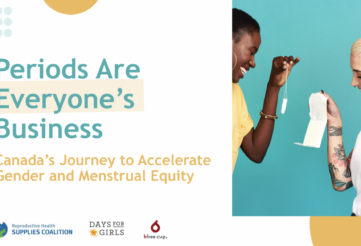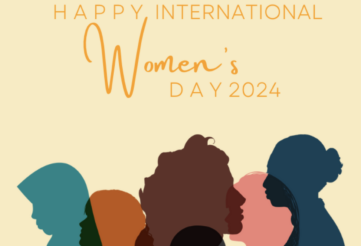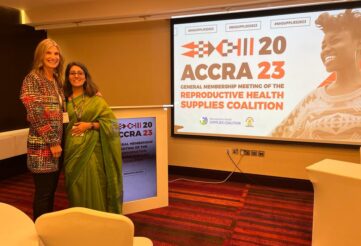Periods In and After the Pandemic: Refugee Spotlight — Webinar Recap
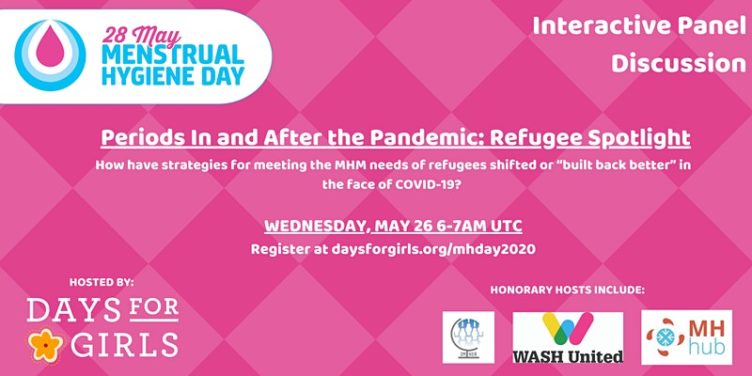
In celebration of MH Day 2021 and this year’s theme #ItsTimeForAction, Days for Girls gathered partners for a special webinar event, “Periods in and after the pandemic: Refugee Spotlight” (scroll down to watch the full replay).
Menstrual health in a time of emergency has been a key focus of the past year’s MH field-building efforts. For Days for Girls International, this focus has highlighted the question: How are the needs of women and girl refugees being met as they navigate caring for their menstrual health, in the compounded emergency states of displacement and pandemic?
To answer this question, our webinar explored how strategies for meeting MH needs of refugees have shifted or “built back better” in the face of COVID-19.Supported by honorary co-hosts WASH United, MH Hub, and IMHER, the conversation brought together four expert panelists working in and alongside refugee communities in Bangladesh, Lebanon, Rwanda, and Uganda. Here, we highlight key challenges shared, strategies to learn from, and challenges with promise.
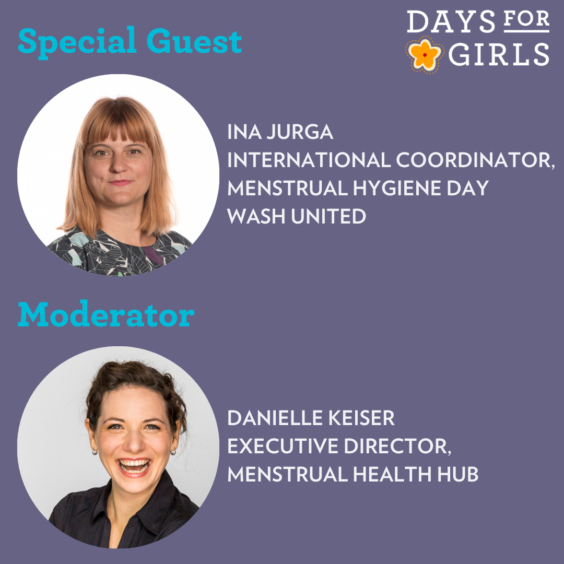
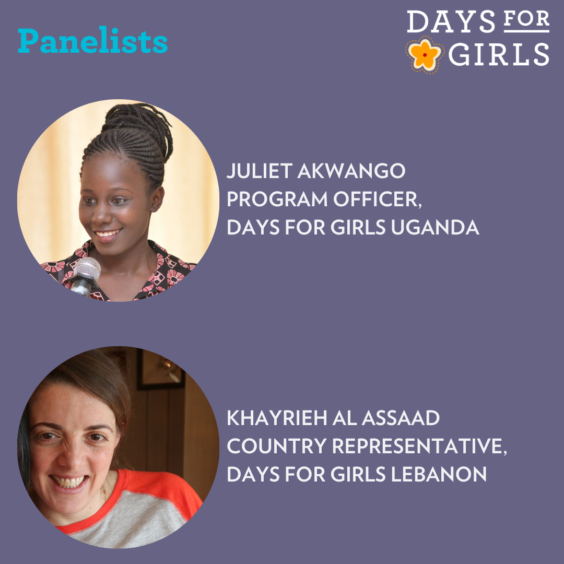
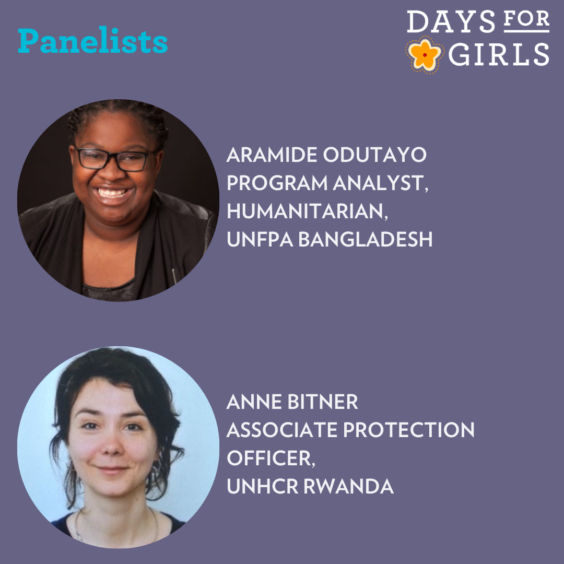
Key MH Challenges in Humanitarian Settings
Refugee women and girls navigate MH challenges that are specific to the context and environment of camps, including lack of privacy and inclusive WASH infrastructure, inadequate menstrual supplies, and lack of information.
Khayrieh Al Assaad, Country Coordinator for Days for Girls Lebanon, shared findings that 60% of women and girls surveyed felt unsafe while changing their menstrual materials. Refugee communities may be constructed with shared washrooms for multiple households, without separate male and female facilities or locking doors. Women shared that while they previously found some privacy to change menstrual products within the home itself, during lockdown men were unable to attend work and so occupied that space, further reducing privacy. Similar challenges resonated in the Ugandan context, where DfG Program Officer, Juliet Akwango, shared that in Kyaka II camp there is also a lack of private or gender-inclusive WASH infrastructure.
This challenge highlights the need to apply a gender lens in infrastructure design. Some best practices developed in the WASH field for menstruator-friendly washrooms include separation of facilities for men and women, locking doors, inclusion of shelves and/or hooks for placing garments and products, sealed or tiled surfaces, access to a tap, and bright lighting around the facility for safe use at night. These are fairly simple retrofits, but require resources to implement.
A second key challenge discussed was access to adequate menstrual materials, especially during the pandemic. Disposable pads are the most commonly distributed product in refugee camps, so menstruators often lack the ability to choose for themselves which menstrual materials best suit their needs. The dignity of product choice is an important part of menstrual health, included in the latest definition put forth by the GMC this year. With regards to the pandemic, disposable pads posed a challenge during lockdown because their use requires a steady supply of product month after month. When supply chains were disrupted, school-based distribution programs shut down, funding streams were reallocated, and product costs rose in some countries, and access to disposable pad products decreased significantly.
Lastly, menstruators in refugee camps struggled to access accurate and timely information about menstruation during lockdown, as many sexual and reproductive health (SRH) educational programs (in and outside of schools) were interrupted. Anne Bitner of UNHCR Rwanda shared that this is one of the biggest challenges for young women in Kiziba Camp, as access to timely SRHR information for both boys and girls can help to reduce menstrual stigma and taboo, unwanted teen pregnancy, and sexual and gender-based violence.
While the pandemic disrupted delivery of humanitarian aid programs at large and amplified MH challenges, it also illuminated the importance of MH where previously overlooked. As a result, opportunities for learning, innovation, and program improvement arose. Now, we take a look at some promising strategies that gained momentum over the course of 2020.
Strategies with Promise
Expanding product options through incorporation of washables.
Increasingly throughout the pandemic, Days for Girls has been working with humanitarian aid agencies including UNFPA and UNHCR to add another product option in the form of washable pads, which play a unique and important role on the larger stage of menstrual product options. Washable pads are a long-lasting, cost-effective, and reusable period solution that menstruators were able to rely on month after month in the midst of lockdown, when disposable products were not available. And in emergency situations when safe disposal of products was not possible, washable pads offered a hygienic and environmentally safe solution.
Pairing product access and livelihood opportunity through local production of menstrual solutions
Aramide Odutayo of UNFPA Bangladesh shared how in Cox’s Bazar, UNFPA, UN Women, IOM, and DfG are partnering to implement an innovative approach that will at once equip women and girls with livelihood training like sewing and basic business skills, while increasing access to menstrual products within the camp community. The partners are planning to train up sewing groups that will produce Days for Girls washable pad products for women and girls in the camps.
The DfG Uganda office has launched a similar partnership with Good Neighbors in Kyaka II camp, piloting the startup of enterprise units so that sewists can earn income, while women and girls can access menstrual products within their own community. This project in particular will be an opportunity for the partners to test and refine target market, price point, and product package for washable pads in refugee contexts.
While both of these efforts are in early stages, they hold promise to both improve livelihood outcomes for those producing the washable pads, and also to increase product security within the camps where the pads will be produced locally.
Strategies to Learn From
Direct Product Provision vs. Cash Transfer
In the past year, UNHCR Rwanda shifted from distributing essential goods to refugees towards a cash transfer approach. With monthly cash transfers, refugees are equipped to purchase their own essential goods and to choose the products their family needs or prefers each month. However, there was an unexpected downside to this shift for menstrual health. Where menstrual products were previously distributed directly, families now budget for menstrual products alongside other essential products such as food or household items.
One young woman living in Kiziba camp shared that often, the cash transfer does not cover monthly food expenses so it is difficult to prioritize purchase of menstrual products. In communities where menstruation is highly stigmatized or not discussed between family members (especially among men, who tend to hold financial decision-making power), it may be difficult especially for youth to advocate for using the cash stipend to purchase menstrual products. As a result, the shift has actually decreased access to menstrual products for women and girls in Kiziba. Florence shared that many have resorted to using tissues or fabric scraps to manage their menstruation.
It’s Time for Action
Moving forward, it is important that a menstrual health lens is considered when evaluating the impacts of shifts in humanitarian aid programs such as those targeting provision of essential goods – because menstrual products are indeed an essential good. Knowing that menstruation may be a taboo topic and that household budgets may not cover MH products, the cash transfer program may consider some adaptations:
- In addition to the standard household cash transfer, reinstate direct product provision specifically for menstrual and other SRH-related products.
- Increase in the amount of the monthly cash transfer, paired with community education efforts surrounding menstrual health and equity, in order to increase community awareness about why prioritizing MH products within the household budget is important.
- In addition to the standard household cash transfer, provide an additional transfer directly to women of reproductive age specifically for purchase of menstrual and other SRH-related products.
Where Do We Go From Here?
Despite MH challenges exacerbated by COVID-19, the pandemic made visible to a wide array of development stakeholders the importance of supporting menstrual health for refugee women and girls. This panel was a meaningful space for stakeholders including humanitarian aid program officers, partners, and refugees themselves to amplify the nuanced aspects of MH in their contexts, share lessons learned, and discuss creative and innovative solutions. In the words of moderator Danielle Keiser, their contributions shone a piercing spotlight on the fact that menstruation matters – and it especially matters at the margins.
This synopsis was created in collaboration with our partners at IMHER.







